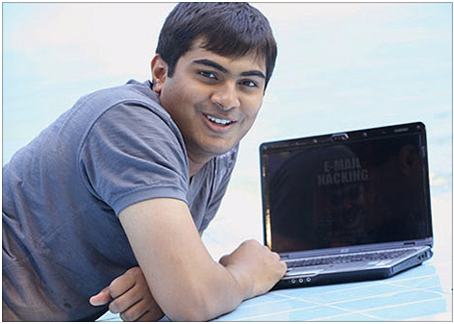Digital India: Let's Pick our Ambassadors Carefully.
Ankit Fadia, hacker, ethical or not, becomes Digital India Brand Ambassador!

NEW DELHI: Ankit Fadia, is an author and a self-proclaimed ‘ethical hacker’ and for the past few days the news has been abuzz about how he was nominated as the brand ambassador of the ‘Digitial India’ campaign, amongst others:
1. Shri Satwat Jagwani, All India IIT-JEE —Advanced Topper -2015 (Student)
2. Ms. Krati Tiwari, All India IIT-JEE —Advanced Girl Topper -2015 (Student)
3. Mr Ankit Fadia, Author & Ethical Hacker
4. Shri Pranav Mistry, Samsung USA (Computer Scientist/ Author of 6th Sense)
While we look for a brand ambassador for the campaign, we must be wary of the identity these individuals will give to such a programme. Those currently nominated, as ambassadors other than Fadia, have been three IIT-JEE toppers. This though restricts the purpose of the internet to engineers, and technological whizzes, but the internet is so much more.
We need individuals, everyday citizens who used the Internet to realise their dreams, passions and interests that helped them overcome their circumstances. Everyone loves an underdog, and his story of triumph. The internet has been proven time and time again as a medium that allows such a movement.
One such story is of Naezy a young muslim rapper from Kurla, Mumbai. Who fell into bad ways, but found an outlet through rapping, and through the internet an audience. We sat down before his gig and talked about the internet, its neutrality, his music and what it means.
“If the net is no longer neutral, artistes like me will not be able to overcome their circumstances,” says Naezy, or Naved Sheikh, matter-of-factly. A young Urdu rapper from Mumbai, Naezy and I stand outside Blue Frog, a popular live music destination in Lower Parel, where he is to perform later in the evening to an audience that, in the words of a bystander, would come primarily to see him.
Naezy speaks in a thick Mumbaikar accent about religion, the language he uses and the content of his music. What stands out most is the central role that the Internet played in his creative journey. I found out about Naezy through one of the several listicles that circulate on Facebook. Naezy’s name was on a list of the 20 young artistes to watch out for in South Asia.
As a young boy, Naezy was exposed to hip hop by DJs in the chawls. He was enthralled by the ability the genre had to make people dance while still carrying a message. He would run to the chawls’ cyber cafes and print out lyrics by artistes he admired such as Tupac Shakur, Krs1 and Rakhim. It was also in these small community Internet browsing cafes that he discovered the potential of hip hop as a tool for transformation. “If I succeed, I want my community to move ahead with me,” he says.
Naezy’s writing and rapping style are self-reflective and his songs talk about his own life and experiences. His work is almost autobiographical. He was born in an orthodox Muslim family and music was not part of his education. Rather, it was an expression of rebellion.
He released his first song in a hurry, just to disprove his detractors. He managed to record his song quickly, thanks to the resources freely available on the Internet, which has helped spawn other musicians as well. An advertising campaign by Idea, a mobile networks company, captures this transformative quality of the Internet. Naezy epitomises such a transformation.
Artistes such as Naezy, who rely on jugaad for most of their equipment, will be most devastated if the Internet is no longer neutral. Sites that cannot afford to be part of the zero-rating deal, or sites that do not pay a licence fee to telecom service providers will either load slower or exist outside the walled garden of paid content. That means that the tools needed by a musician of spartan means would be limited. In a neutral net dispensation, content from all over can be accessed with ease.
If Naezy now downloads his beats from a website that does not pay Airtel, he might not get access to these websites, and might have to pay a premium to continue accessing them. For someone like him, this just becomes unviable.
Naezy is now someone who can be called an Internet evangelist. He is vocal about the way his pursuit transformed his life. Part of the initiative of Sabke Liye Broadband, he rapped on the streets of Mumbai, where he propagated the virtues of having a broadband Internet connection by talking about how his life changed for the better, thanks to the Internet.
Millions would likely agree with Naezy’s lyrics.
To reduce the value of the ‘digital India’ campaign to IITians is problematic, and we must look at specific case studies of how everyday citizens have used the internet to realise their passions.



